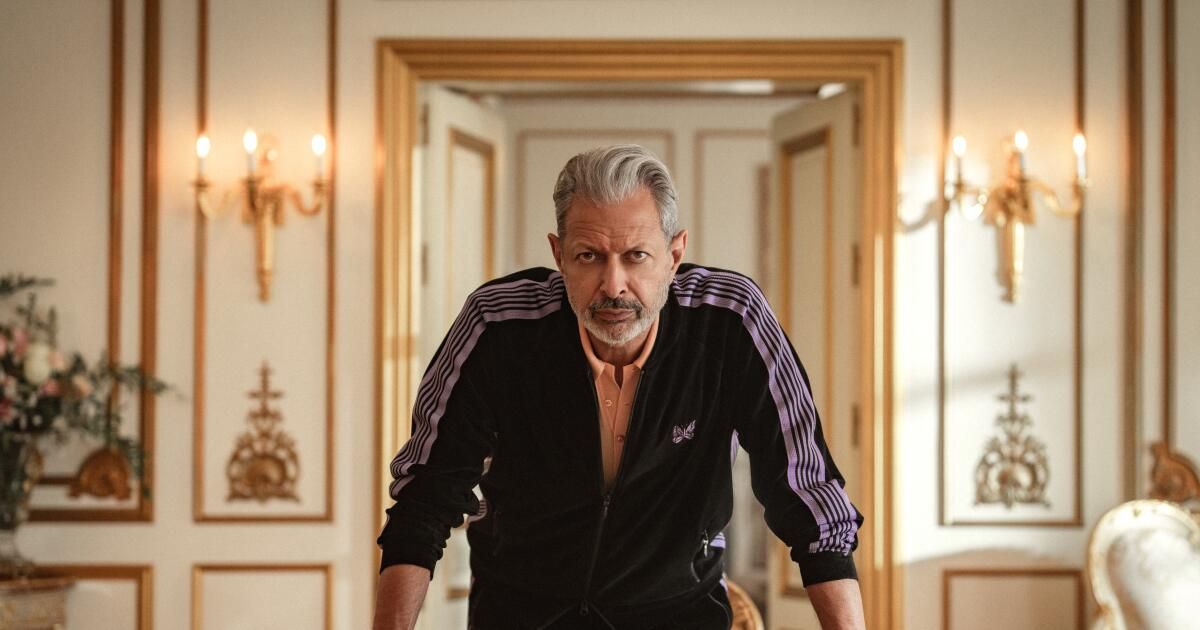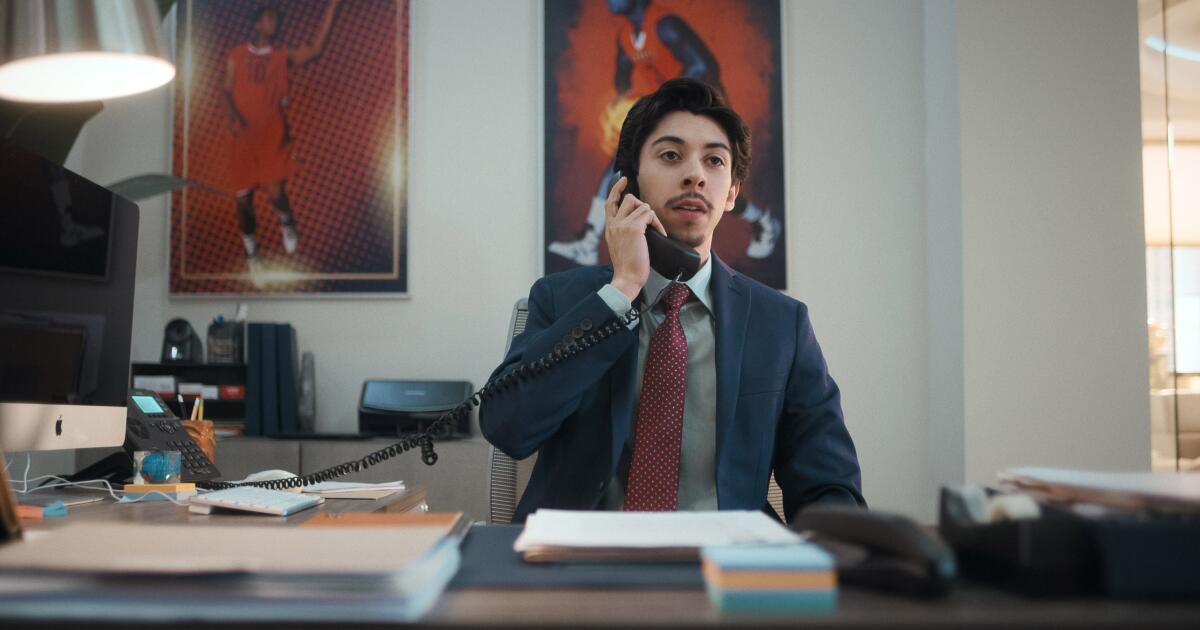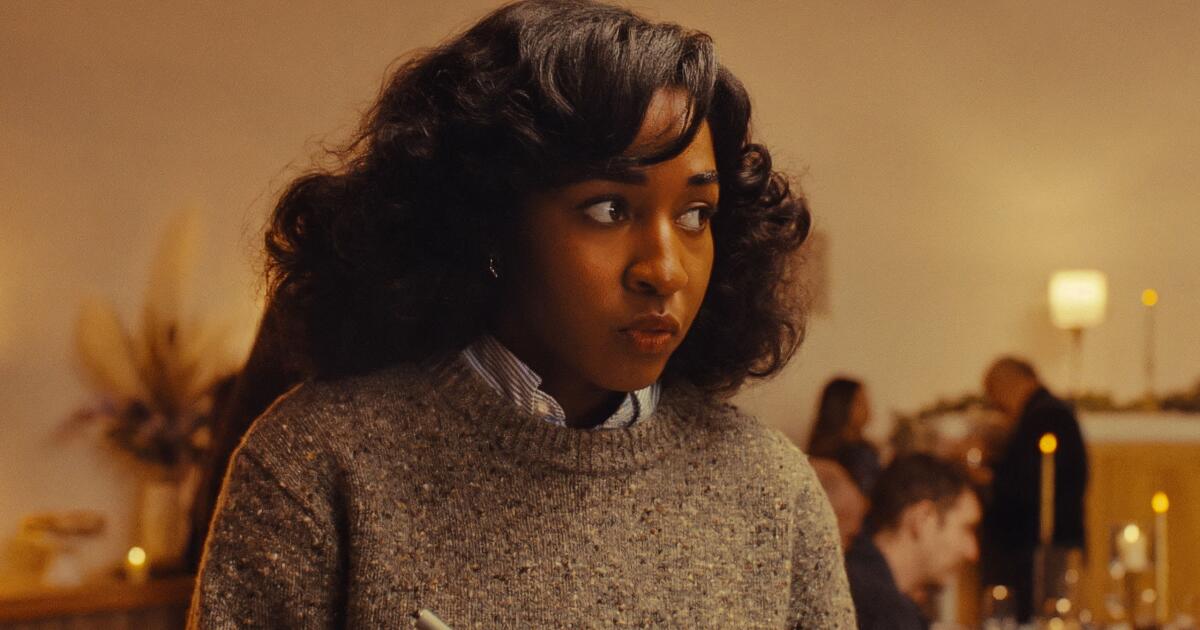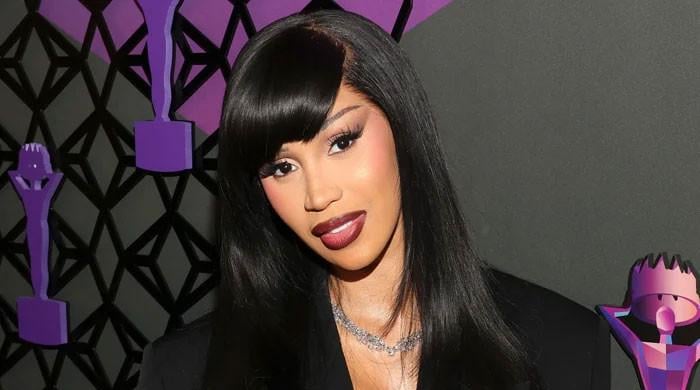I’m sorry to disappoint all those who, upon hearing about the new “Kaos” series, which Netflix calls “KAOS,” were expecting a “Get Smart” spin-off. Instead, we are looking at the third series currently in production, steeped in Greek history and mythology, after the Fox animated series “Krapopolis” and the excellent “Percy Jackson and the Olympians” on Disney+. (And three, as we say in the news world, is a trend.)
“Kaos,” which opens Thursday, is set in a modern, alternative, metropolitan “Krete” (played by Spain), ruled from above by Zeus (Jeff Goldblum), king of the gods, the boss of all bosses —if I may use an expression from across the Ionian Sea— and locally, with military overtones, by President Minos (Stanley Townsend), a “fool” in Zeus’s opinion. Mount Olympus is depicted here as a vast white-and-gold mansion, where Zeus lives with Hera (Janet McTeer), his queen, wife—and sister, he helpfully adds a title.
Other characters appear and disappear, not always of their own volition, including Zeus's brother Poseidon (Cliff Curtis), who hangs out on a luxury superyacht, and his son Dionysus (Nabhaan Rizwan), a bored club-going kid looking for something more. The other depressed brother, Hades (David Thewlis), is stuck overseeing the underworld, a bureaucracy rendered in black and white where the architecture is all unremarkable brutality.
In “Kaos,” the underworld is presented in black and white. Hades, the god of the underworld, is played by David Thewlis. Rakie Ayola plays Persephone.
(Justin Downing / Netflix)
Early on, Zeus, who nostalgically recalls the days when the family would gather for barbecues, becomes obsessed with a newly discovered “vertical wrinkle” on his forehead, which he links to a prophecy predicting the end of the family’s power. (His mood is not helped by the fact that a monument inaugurated on “Olympic Day” has been desecrated by blasphemous graffiti against the gods and a mountain of excrement.)
“I’m supposed to be immortal, what’s that? Aging? What’s next? A drop in bone density? Gum recession? Need for the daily cooked prune?” she laments to Prometheus (Stephen Dillane), whom Zeus occasionally magically transports to Olympus from the cliff where he’s chained him, and where an eagle canonically tears out his liver anew every day. Zeus, who imagines Prometheus is still somehow his friend—“my only friend”—looks to him for companionship and comfort. Prometheus, who is also our narrator, calls Zeus “a transcendent, utter bastard, but don’t worry, there’s a plan to bring him down.”
Meanwhile, on Earth — and below it — the story of Orpheus (Killian Scott) and his wife Eurydice (Aurora Perrineau) — who prefers to be called “Riddy” — is being remade. Now an idolized pop star whose songs are all about her; where Eurydice was just a beautiful love object, Riddy has autonomy and independence. The myth requires that she die and he come looking for her in the underworld, which I trust you don’t consider a spoiler. (That she has fallen out of love and is planning to leave him is a new complication.) Orpheus gets help along the way from Dionysus, who likes humans and has decided this is the project he needs to improve his own life.

Aurora Perrineau as Riddy and Killian Scott as Orpheus in “Kaos.”
(Netflix)
There's a small conceptual step between the powerful, dysfunctional family that were the Greek gods and something like “Succession,” and its cruelty also recalls mafia stories and various tales of fascist governments and rebel factions (it couldn't have affected the tone).
The degree to which this type of drama appeals to you may vary, but while the rethinking of these characters is conceptually interesting, even intriguing, after a while I found their infighting, adulterous sexual escapades, and thoughtless cruelty increasingly tedious. (I realize these same elements will constitute a recommendation for some viewers.)
Directed largely by Georgi Banks-Davies (“I Hate Suzie,” the cruelly canceled “Paper Girls”), the production is imaginative and brilliantly executed. There are some cute concepts: cereal brands with names like Spartan Crunch and Achilles’ Heels, and bobbleheads of Zeus and Poseidon. The entrance to the underworld is through a garbage can. All the phones are landlines. (Zeus leaving messages on his relatives’ answering machines that don’t answer makes for an amusing montage.) There’s a fax machine in the afterlife. The Fates, with Eddie Izzard as Lachesis, hang out in a bar, where the chance to resurrect a loved one is presented as a kind of pub quiz show. Debi Mazar turns up as a good Medusa, with a scarf tied around her snake hair.
Throughout the series' ten episodes, which jump from tone to tone, between and within its various threads (comedy, tragedy, satire, horror), a lot happens. It doesn't always mesh well, and the darker the series gets, the duller it becomes.
“Kaos” is certainly smart, but it’s also a little cold. Dionysus, Riddy, Minos’ daughter Ari (Leila Farzad) and Ceneo (Misia Butler), whom Riddy meets in the underworld, are the characters most likely to elicit an emotional response, but this has as much to do with the appeal of the actors as the story they’re portraying.
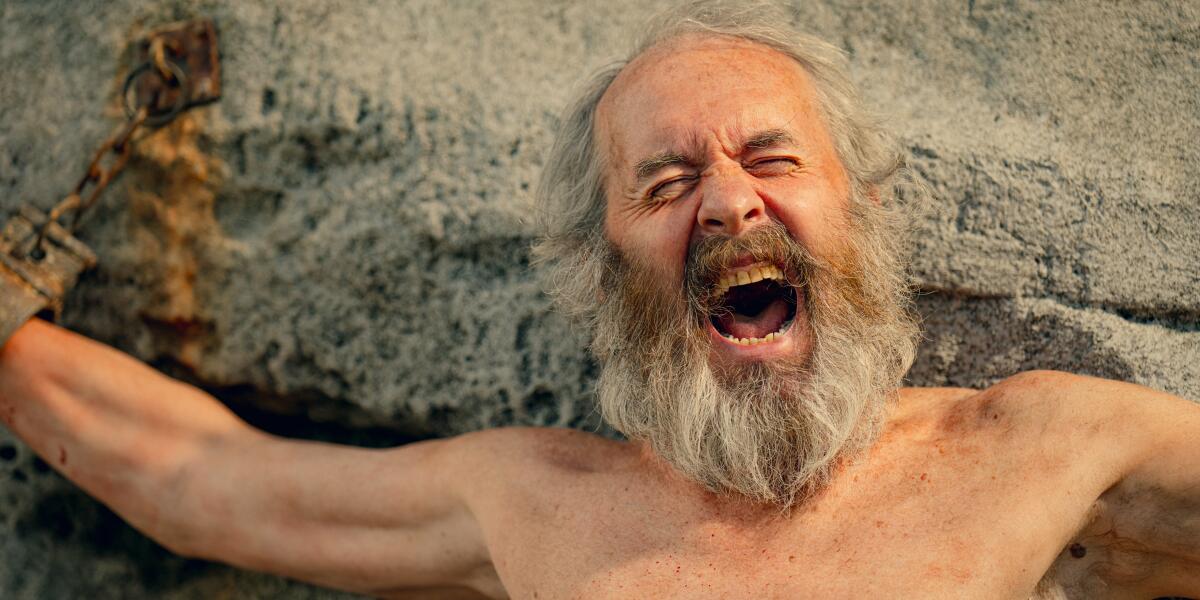
Stephen Dillane as Prometheus, god of fire and best friend of Zeus. He is chained to a cliff and has his liver pecked out by an eagle every day.
(Daniel Escale / Netflix)
As with any production in which Goldblum appears, it's one of the best reasons to watch it. In fact, if Hugh Grant, who was originally cast as Zeus, hadn't had to leave the series, it would have been very different and, no offense to Grant, less lively. The role seems to have been molded, or reshaped, by Goldblum's nervous rhythms and a performance that retains a comic edge no matter how serious the subject matter. If the character gets boring, the player doesn't.
Charlie Covell (“The End of the F***ing World”), whose credit reads “written, created and produced by,” studied English at Oxford, and you can’t study English without delving into the Greek myths that shape so many modern narratives, metaphors and words. If you know anything about Zeus and Hera or Orpheus and Eurydice, let alone Cassandra (Billie Piper), Charon (Ramon Tikaram) or Daedalus (Matt Fraser), you’ll have a head start on the dramatic characters; you'll get the indirect references to Icarus without having to be told that story again. (And they won't.)
In any case, there is enough explanation provided so that you don't have to rush to Wikipedia all the time. But you can do that anyway.

